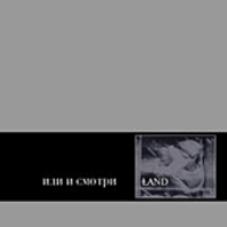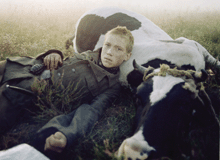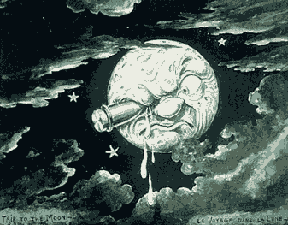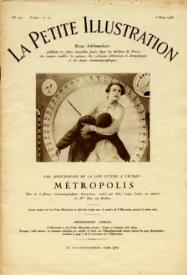

Land's activities were always like a seesaw. A good number of persons passed through the group between 1988 and 1990 before it stabilised until 1995, before the hasty split. The diverse activities of each member corresponded to the needs of the moment, and were never set. Some tracks from the 90/95 period were diffused on six very limited tapes, and effectively, 'Anger' is indeed the last release from Land. Once this was finished, the band split up for several reasons. Afterwards, I occasionally wrote a few tracks, but never in view of being released.
What pushed you then, after 'six years of hibernation', to once again make you musical compositions available to the public?
Nothing premeditated, just a combination of circumstances and more favourable dispositions. In fact, I moved to Paris two years ago. Luck would have it that another original member of Land, my childhood friend, also moved to Paris on the very same day ! And even if he does not really have the time for music, it was the occasion to renew with all that. It could have happened later like never. Nothing was programmed.

One can nonetheless consider your return as 'meteoric'. Eis & Licht were convinced by the 'Idi i Smotri' demo as the label quickly released it as a 10". Then came the release of 'Opuscule' on Divine Comedy... How were these contacts established?
I realised 40 promo copies of the "Idi i Smotri" CD-R that were mainly destined for our circle of
friends. I sent about ten copies to some labels and magazines. Stephan from Eis & Licht answered me
favourably by proposing a collaboration with Eis & Licht. We quickly agreed on a remasterised vinyl
pressing of "Idi i Smotri".
Concerning Divine Comedy, I did not really know the label and I had not sent them a CD-R. In fact,
it is Fabrice who contacted me through the intermediary of Peter S. There were mutual good feelings
and "Opuscule" was released a few months later.
Let us get back to 'Idi i Smotri'. Is it a definitive reference to the soviet film by Elem Klimov ?
Indeed, "idi i Smotri" refers in part to the film by Elem Klimov. Independently of the theme, this
film is a great lesson in cinema that cannot leave the viewer unscathed. His work, notably on the
lights and the sound, is breathtaking.
The remainder of the four tracks have for starting point certain poems of Konstantin Simonov.

I have recently learned that Land made its first steps on stage, opening for Norma Loy, at the end of the 80's... What memories do you keep from those moments ?... Do you wish to mention them or are they definitely buried in the 'archives' of the band ?
More spontaneity, more innocence too, many emotions... For the rest, everything is a bit hazy today.
Playing live is an immense pleasure for me. But for me, a concert is an exchange between several
people on stage and an audience. Today, I see no interest in being on stage if I have to be alone
behind some machines to do this type of music. This kind of event bores me to no end. There are no
inherent dynamics, no alchemy. If Land were to play live one day, it would once again be under the
form of a group. But this demands time and motivated persons ; which is another problem.
I have only been able to listen to the downloadable MP3 titles... will these ancient productions be reissued one day or do they definitely belong to the past ?
These ancient productions belong for more than one reason to the past. For a majority of them, I have a lot of difficulty to listen to them again, as they only convey bad memories. That said, I receive quite a few emails from persons asking if CD reissues are planned. This idea has always bothered me, but today I think about it with more serenity, perhaps as a way of definitely turning the page.
Does, for example, the suppression from the site of the information relative to these old productions belong to your process of forgetfulness ?
No, it was planned from the start. The aim was to use these old productions to shoulder "Idi i Smotri" while I was looking for a label. There is no process of forgetfulness or denial. It is just the past. Nothing more.
But let's get back to the idea of a possible reissue of the old productions...
If it does see the day, it will be under the form of a single compilation CD regrouping only a few tracks from the diverse periods of Land. The old productions will never be reissued in their original form. For the moment, I am sorting out what is in my boxes to see if there are things that deserve to be reissued.
Are there already some contacts established with a label so that this compilation will see the day ?
Yes, but I'm not at all in a hurry. The only reason that pushes me to do a sort out now is that I have already lost plenty of tracks because of the bad state of most of the sources. A DAT tape ages very badly.
A last question to close this introspective passage on Land's past...
The female vocals present on the old tracks seem to have disappeared since 'Idi i Smotri'. Can one
conclude that Land is now an instrumental only project without the contribution of vocals?
They disappeared with "Anger" to be more precise. To answer your question, no, Land does not have the vocation to be just an instrumental project. If the opportunity of a new female voice presents itself, then Land will evolve again. Otherwise, I will stop again one day, because for certain themes, this musical blueprint will soon be insufficient for my needs.
So, you are far from being a novice in this scene. Today, how do you perceive this scene and its evolution since the end of the 80's ?
I have never considered myself as part of a scene. Therefore, I have never been preoccupied by the trends and the evolution of various currents. Today it is obvious that I feel even less concerned by all that. If a music touches me, I do not care about its provenance or its period. At the moment, I'd say that the music is more and more partitioned, and there are many dead ends.
Your interest for History...
I am effectively, amongst other things, interested in the history of the XIXth and the beginning of the XXth century.
Where does your interest for this period of history come from... at what moment do you place your beginning of the XXth century, during the inter-war period ?
I have always been fascinated by this transitional period that brings us to the modern age. All the domains were in constant ebullition : literature, ideas, painting, architecture, photography, science. If you ask me when I situate the real beginning of the XXth century, I will say 1914. If you ask me when I situate the end of my period of "predilection", I will answer you the end of the 20's.
What is your view on photography (through the technical innovations such as the invention of new compact cameras: the Ermanox, the Leica...; photography's contribution to the scenic arts of the time...) and on the particular genre that is theatre photography, whose first steps date back to 1839 ?
At its beginnings, theatre photography does not inspire me too much for the reason that, limited by the
technique, it only allowed photo sessions that functioned in the manner of scenic reconstitutions.
Furthermore, the process was purely commercial, only a few photographers at the time had the freedom to
affirm their own ideas through the realisation of portraits. From the XIXth century, I'm more attracted
by the work of photographers such as Le Gray, the Heliographic mission, Nadar, Marville or the photos
taken during the uprising of the Commune...
Theatre photography of the early XXth century does not say much to me either... it is far too rigid
for my taste. I like the portraits of Henri-Manuel a lot, but from these decades and in different
domains, I am more interested by the works of Sander, Atget, the Constructivists, the Bauhaus, Man Ray,
or a little bit later Bourke-White.
On the other hand, and I think it is quite involuntary, you forgot to mention the cinema... Do you consider, like some film enthusiasts, that the 20's were like a golden age, of avant-guard and freedom for filmmaking, and this despite the crisis that hit the French production at the end of the 20's ?
Yes and no, because the period I allude to encloses a good part of the XIXth century. A period during
which cinema was quasi inexistent.
I do not consider the cinema of the 20's as a golden age. People like Feuillade or Méliès did not
wait for the 20's to turn filmmaking into a major art, although they did not realise it at the time...
Indeed, it was an extremely fertile period but I find just as much interest and pertinence in the
preceding and following ones.

To remain in the domain of the cinema of the 20's, the cinematographic productions were characterised by a certain evasion from reality... How do you perceive this difference between the society depicted in the films, where there was a lot of dancing, and the post-war social reality ?
I see it as a reaction to the 14/18 period, notably in Germany, with the debauch of energy provided by the UFA. A desire to live, to forget, to master ones fears and to affirm oneself despite the financial crisis, the inflation and the always tense international relations due to the peace treaties of 1919. This context did not prevent people from dancing and enjoying themselves, on the contrary... For me it is a very elegant aesthetic period despite the social context.
What is your view on these different currents (impressionism, avant-gardism, 'cinéroman', 'pure cinema') and towards which go(es) your preference(s) ?
All these currents date back to a period where filmmaking was still young, and because of this, was in
constant evolution during a reduced time period. Thus it benefited from many artistic currents and
different approaches. It was a permanent self-questioning and each movement was in some way a response
to another one... These movements do not attract me from the point of view of the results (like 'pure
cinema' for example), but much more for the intellectual processes they engendered.
Concerning avant-gardism, if you are alluding to the movement inspired, amongst others, by the
spirit of Dadaism, yes I am a fan, even if for me, the Dadaist movement inadvertently lead to the
frightening deviances that now constitute our daily 'artistic' environment.
I find impressionism interesting for its aesthetic particularities and its editing but I'm much
more attracted by expressionism and what it expressed.

Are you referring, amongst other things, to Fritz Lang's 'Metropolis'? What attracts you amongst the different characteristics of this current ? The violent and tormented aesthetic used to translate some atmospheres of revolt and uneasiness ? The exaggerated screenplay of the actors ?...
Yes amongst other things... 'Metropolis' is a monument ; even if on this subject, Fritz Lang never
considered himself an expressionist.
But in general, I'm seduced by most of the films produced by this current : the management of the
lights, the centring, the atmospheres... with a particular attraction for Wiene's 'Das Kabinett des
Doktor Caligari" and its superb geometrical settings, entirely painted on canvas.
I find that the screenplay of the actors is indeed more stylised, but not more exaggerated than in
any other production of the time. Anyway, this exaggeration was inherent to silent movies as it served
to compensate the absence of sound for the dialogs, and the emotions to express.
Some film enthusiasts consider that expressionism, once again, knows a strong resurgence in certain films from Lars Von Trier (Epidemic, 1988), Wim Wenders (The Wings of Desire, 1987), F.J. Ossang (Le Trésor des îles Chiennes, 1991) and more particularly through the work of Tim Burton. Do you share this opinion ?
I think there are some acknowledgements and similarities, but only from an aesthetic point of view. The context and the motivations are totally different.
Under a more general angle, in the domain of the arts, which names do you retain from this period. Who are the artists whose work and artistic process you particularly affection ?
The list would be to fastidious to establish. I ignore if you only make allusion to the 20's or to the 1900/1930 period. Taking into consideration the second possibility, the artists and movements that I appreciate, all domains confounded, as they come, and not at all an exhaustive list : Schiele, Klimt, Guimard, Tichy Gyula, Vhutemas, Bauhaus, Renner, Murnau, Wiene, Lang, Feuillade, Satie, Debussy, Remarque, Kubin, Dix, Kafka, Rodin... But I will stop here, as the list would be too long.
Opuscule 'ou les Mémoires de Jules B.' Really gives the impression of being plunged back to 1917-1924 ? Is there a reason for these precise dates ?
For "Opuscule", the starting point is a notebook of memoirs from Jules B. (that begins in the trenches in 1917 and ends in 1924), as well as other various documents that came with it (photos, tickets...). I've recently updated the Landsite where you can see the first page of this notebook: http://www.landsite.net/site_html/releases.htm
Did you inadvertently come across this notebook in a flea market ? Or were you researching this type of document with an idea already in mind of the theme of your work ? When 'Opuscule' was released, did you not think of a limited edition with which you could have offered more food for thought to the listener (I am thinking of long extracts from this notebook...) ? Unless the minimalism of the artwork was deliberate and/or was dictated by 'economical imperatives' ?
No, I did not have to do any research for "Opuscule". I do not work in this manner. In fact, I have
never searched a single document for a project. It is the opposite that happens. I am interested in
things that incite me, if it is possible, to document myself, to travel, to vision and collect documents.
It is only later, that the eventuality of transforming it into sound material comes to mind. It is a
very slow process, as I never have Land in mind when I start to get a close interest in something. Land
is only a form of expression amongst others. It is not systematic and its use is not a means to an end
as far as I am concerned.
The minimalism of the artwork was an economical imperative. But that did not bother me for the
overall conception, even if a booklet would have been interesting. I really hope to be able to do it for
future releases.
However, I have a shared opinion on the "limited editions". The problem today, is that everything
released is so-called limited, ultra-collector, sold out before it is even released. One talks of an
underground scene, but one only reproduces the same ineptitudes of the major retailers. To be brief,
I do not see the interest for the music in all that. When I buy a record, what interests me above all
is the music. If the packaging brings a plus to the content, it is fine ; but at the moment I am not
sure of the validity of all this business. Of course all releases are done in small quantities. But I
find there is a margin between this evident economical necessity and the constant re-airing of the same
old banalities. And, what is the interest of selling 90 copies of a record when one knows that many
other persons are prepared to buy it ? I appreciate beautiful packagings but they must serve the music
and what it expresses, not the contrary. When I see what happens on ebay, I feel sad...
I might release some in the future, but the theme would necessarily require such a process.
The evocation of the First World War is present, gripping... what does this tragedy inspire to you today ?
Nothing more than a collective suicide. "Opuscule" does not deal with the war itself (except "Décembre
incertain" and to a lesser degree "Pilon"), but more of its consequences and repercussions on the
individual, of the trauma he was submitted to, his sentimental life, his social reinsertion.
This is what I tried to transcribe with "Opuscule". I only interested myself on the man, trying to
avoid, as much as can be, voyeurism. But, the angle under which I approach "Opuscule", is my personal
reflection. Upon listening, each one will forge his own images and his own interpretation.
Can you reveal the source from which is extracted the "human" voice narrating the suffering in the trenches ? Beyond the traces of the past, how did you immerse yourself in the post-war atmosphere ?
The extracts come from a film by Raymond Bernard drawn from the Dorgelès novel "Croix de Bois" (which has nothing to do with the movement of the 30's). The post-war atmosphere is familiar to me at the moment in reason of researches I am leading on other subjects of the same period. I also re-visioned certain films.
Did you nevertheless immerse yourself in trench literature to prepare this work ?
I only reread some passages of certain classics (Remarque, Dorgelès, Barbusse, the "XIII Danses Macabres" of Vaillant-Couturier, the "paroles de poilus"...) but no more, as I had already read these books a long time ago.
Are you a collector of old papers, old things ?...
Indeed, I collect old papers to the extent that I lead several projects in parallel that require research and such acquisitions. I also like to rummage in flea markets to find old things that I then restore. However, I do not live in a museum and I am not attached to the past at all.
Nevertheless, there is a nostalgic element in your music, if only through the extracts of period songs that you distillate here and there... Do you assume it or do you leave the responsibility, the interpretation to the listeners ?
No, I do not assume any nostalgia on "Opuscule". The contrary would even be quite unwarranted. Although I appreciate enormously the songs from that period, here they only serve the purpose and the context. Furthermore, their content illustrates perfectly the sentiments and the moods I wanted to express. For the rest, each one will effectively interpret this his own way.
A new 10" entitled 'Praha' is in preparation. Can you tell us a bit more ?
"Praha" will be the first halt of a voyage comprised of three major stages. It is a project that has been in gestation for a few years and that arrives at maturation today. If all goes well, "Praha" will be finished by next April/May...
In the short term, a tribute to Jean-Marc Dauvergne to which you participated, should see the day on Divine Comedy. What can you tell us on your implication in this project, your sentiments about Dauvergne's paintings... ?
I find them favourable to story telling. Most of them give me the impression of being the witnesses
of past deeds, whilst keeping religiously their secrets… wise of their experience...
For this tribute, "Branchages" is the painting that inspired me the most and seemed to be obvious
to illustrate from a personal point of view.
As a conclusion, and in a more long-term prospect, what are the stages that should mark out Land's musical path in the future ?
Apart from the triptych, I have a more ambitious project on an theatre actress of the beginning of the
century. But I am still very far from a musical realisation of this subject.
The future seems rather hypothetical to me...
Nathalie F.
Winter 2003
Land: www.landsite.net
Discography:
"Idi i Smotri" (LAN 07) - Promo CD-R + Postcard - 2001
"Idi i Smotri" (Rex Regum) - Eis & Licht - 2002
"Opuscule" (DC 014) - Divine Comedy Records - 2002
V/A - Jean Marc Dauvergne "Ombres et Lumières" (DC 022) - Divine Comedy Records - 2003